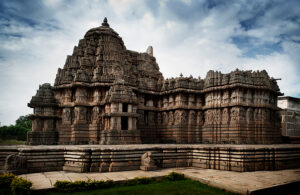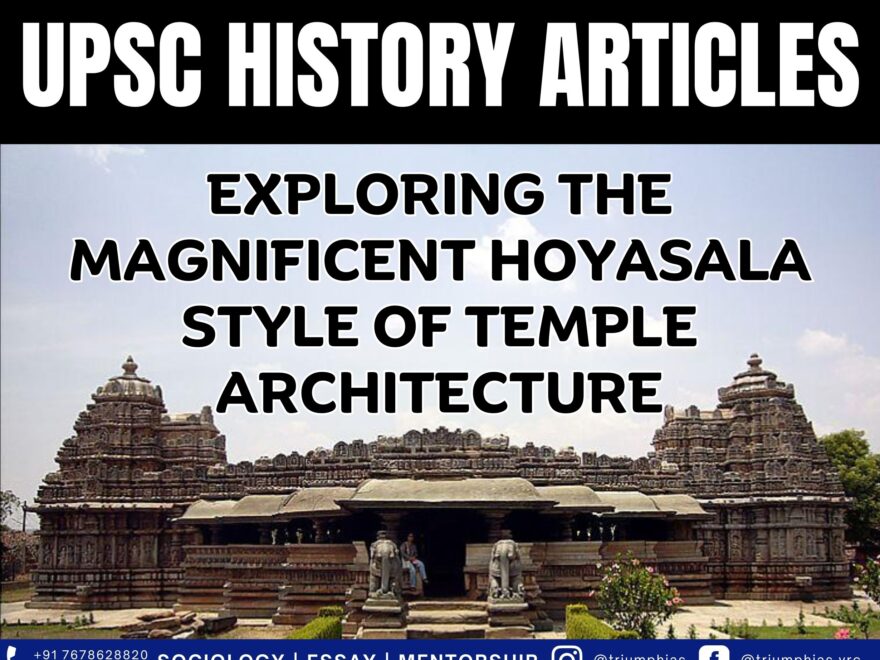Hoyasala style of temple architecture
(Relevant for Historical section of General Studies Paper Prelims/Mains)

Hoysala architecture
Hoysala architecture represents the architectural style developed during the reign of the Hoysala Empire from the 11th to the 14th centuries, primarily concentrated in the southern region of Karnataka.
The Hoysalas ingeniously amalgamated the Vesara and Dravida architectural styles, giving rise to a distinctive Hoysala style.
This unique style is characterized by several significant elements, including:
A platform fashioned in the shape of a star.
- The jagati encircling the temple, serving as an open pradakshinapatha for circumambulation.
- Polished pillars adorned with a diverse array of designs.
- Intricate carvings and exquisitely crafted madanika figures.
- Vimana (shikara) in a pyramidical form.
- Most of their temples are designed in the Bhumija style, featuring miniature shikaras intricately carved onto the outer walls of the temple.
Hoysala temples are often referred to as hybrid or vesara due to their distinctive style, which falls somewhere between the Dravida and Nagara styles, displaying elements of both.
In contrast to the conventional design of a single inner chamber alongside a pillared hall, Hoysala temples feature a unique arrangement with multiple shrines clustered around a central pillared hall. This arrangement takes on the form of a meticulously designed star pattern.
The most prominent hallmark of these temples lies in their intricate complexity. The temples’ architecture evolves from a simple square design into a highly intricate layout with numerous projecting angles. This intricate pattern creates a star-like appearance, giving rise to the term “stellate-plan.”
Crafted from soapstone, a relatively softer material, these temples exhibit remarkably detailed sculptural work. This is particularly evident in the intricate jewelry adorning the temple walls and the sculptures of deities.
Distinguishing themselves from other medieval temples, Hoysala temples stand out for their distinctive star-shaped ground plans and the abundance of decorative carvings that embellish their structures.
Among the renowned examples of Hoysala temples are the Hoysaleshvara Temple (Lord of the Hoysalas) in Halebid, Karnataka, constructed in dark schist stone by a Hoysala king in 1150. Another notable temple is the Chennakeshava Temple in Somnathpura, Karnataka, built around AD 1268 during the rule of Narasimha III. Additionally, the Kesava Temple in Belur, located in the Hassan district of Karnataka, was built by Vishnuvardhana and remains a prominent illustration of this architectural style.
Example Lakshmi Narsimha Temple
- Constructed in the early 13th century under the Hoysala dynasty’s reign, the temple showcases remarkable architectural achievements.
- Designed in the ‘Trikuta’ style, the temple features a unique arrangement of three shrines, each devoted to Lakshmi Narasimha, Venugopalaswamy, and Purushothama.
- Elaborate and intricate carvings in the distinctive Hoysala style adorn the outer walls of the temple, demonstrating exceptional craftsmanship.
- The raised platform, also known as the jagati, is covered with concrete flooring and serves as a pathway for devotees to perform pradakshina, the act of circumambulation around the temple.
To master these intricacies and fare well in the Sociology Optional Syllabus, aspiring sociologists might benefit from guidance by the Best Sociology Optional Teacher and participation in the Best Sociology Optional Coaching. These avenues provide comprehensive assistance, ensuring a solid understanding of sociology’s diverse methodologies and techniques.
Hoysala architecture, Hoyasala style, temple architecture, southern Karnataka, architectural amalgamation, Vesara style, Dravida style, star-shaped design, intricate carvings, unique arrangement, stellate-plan, Hoyaleshvara Temple, Chennakeshava Temple, Kesava Temple, Lakshmi Narasimha Temple, historical temples, architectural achievements, Hoysala architecture, Hoyasala style, temple architecture, Hoysala architecture, Hoyasala style, temple architecture, Hoysala architecture, Hoyasala style, temple architecture, Best Sociology Optional Coaching, Sociology Optional Syllabus.

Choose The Best Sociology Optional Teacher for IAS Preparation?
At the beginning of the journey for Civil Services Examination preparation, many students face a pivotal decision – selecting their optional subject. Questions such as “which optional subject is the best?” and “which optional subject is the most scoring?” frequently come to mind. Choosing the right optional subject, like choosing the best sociology optional teacher, is a subjective yet vital step that requires a thoughtful decision based on facts. A misstep in this crucial decision can indeed prove disastrous.
Ever since the exam pattern was revamped in 2013, the UPSC has eliminated the need for a second optional subject. Now, candidates have to choose only one optional subject for the UPSC Mains, which has two papers of 250 marks each. One of the compelling choices for many has been the sociology optional. However, it’s strongly advised to decide on your optional subject for mains well ahead of time to get sufficient time to complete the syllabus. After all, most students score similarly in General Studies Papers; it’s the score in the optional subject & essay that contributes significantly to the final selection.
“A sound strategy does not rely solely on the popular
Opinion of toppers or famous YouTubers cum teachers.”
It requires understanding one’s ability, interest, and the relevance of the subject, not just for the exam but also for life in general. Hence, when selecting the best sociology teacher, one must consider the usefulness of sociology optional coaching in General Studies, Essay, and Personality Test.
The choice of the optional subject should be based on objective criteria, such as the nature, scope, and size of the syllabus, uniformity and stability in the question pattern, relevance of the syllabic content in daily life in society, and the availability of study material and guidance. For example, choosing the best sociology optional coaching can ensure access to top-quality study materials and experienced teachers. Always remember, the approach of the UPSC optional subject differs from your academic studies of subjects. Therefore, before settling for sociology optional, you need to analyze the syllabus, previous years’ pattern, subject requirements (be it ideal, visionary, numerical, conceptual theoretical), and your comfort level with the subject.
This decision marks a critical point in your UPSC – CSE journey, potentially determining your success in a career in IAS/Civil Services. Therefore, it’s crucial to choose wisely, whether it’s the optional subject or the best sociology optional teacher. Always base your decision on accurate facts, and never let your emotional biases guide your choices. After all, the search for the best sociology optional coaching is about finding the perfect fit for your unique academic needs and aspirations.
To master these intricacies and fare well in the Sociology Optional Syllabus, aspiring sociologists might benefit from guidance by the Best Sociology Optional Teacher and participation in the Best Sociology Optional Coaching. These avenues provide comprehensive assistance, ensuring a solid understanding of sociology’s diverse methodologies and techniques. Sociology, Social theory, Best Sociology Optional Teacher, Best Sociology Optional Coaching, Sociology Optional Syllabus.
Best Sociology Optional Teacher, Sociology Syllabus, Sociology Optional, Sociology Optional Coaching, Best Sociology Optional Coaching, Best Sociology Teacher, Sociology Course, Sociology Teacher, Sociology Foundation, Sociology Foundation Course, Sociology Optional UPSC, Sociology for IAS,
Follow us :


https://t.me/VikashRanjanSociology
Find More Blogs
|
Scope of the subject and comparison with other social sciences |
|||
|
|
|
|
Modernity and social changes in Europe |

